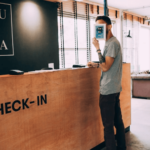No matter how much we strive to be unique–to set ourselves apart from the pack–humans are basically lemmings. Deep down inside, we are most comfortable when we follow the crowd, opt for the most popular choice, and follow the sage advice of our friends. “Social proof” influences many of the decisions that we make–including which hotels we will stay in, what restaurants we will frequent, and on which cruise lines we will sail.
And because of this human propensity for “following,” it is important for companies within the hospitality industry–and those who do their marketing–to recognize the significant role that “social proof” plays in the decisions of their customers, and to use it to their own advantage.
What is “social proof?”
If you were walking down the street and you encountered a group of people looking up at the sky, you are likely going to look up also. After all, these people obviously know something that you do not; therefore, it only makes sense to trust them and aim your eyes upward.
“Social proof” works in the same way. If a bunch of your friends “like” a restaurant on Facebook, have given it good reviews on Yelp, or have checked in at that location on Foursquare, you are more likely to eat there. These are people you trust, so their opinions are “proof” that this is a good place for a meal.
Winning “last minute” bookings
Mobile users, particularly those who wish to make a last-minute booking, are unlikely to plow through a pile of reviews. Instead, they want a quick way to find out if someone within their social networks has stayed at a hotel in the area.
Hot Hotels has cleverly partnered with SeatID to make this possible. Users of Hot Hotels’ booking app are able to log in via their LinkedIn or Facebook accounts and find out if any of their friends have used a specific hotel or visited a particular region. This “social proof” will likely determine which lodgings they select.
Building an arsenal of “social proof”
In order to benefit from social proof, a company must first collect “likes,” “five-star” ratings, and glowing comments. GuestNetix reports that since they incorporated customer feedback into the checkout procedure, they have seen a four-fold increase in the number of patrons providing hotel reviews. These reviews will translate into social proof for the friends and relatives of these patrons and win new clientele in the future.
Social Proof is all about Social Media
The quickest way for your clientele to access social proof is via social media networks. These same networks are also the fastest venue through which to build your company’s social proof. New York City’s Casablanca Hotel is well aware of this, having successfully created one of the most celebrated Facebook campaigns in the Big Apple’s hotel industry.
While Casablanca uses its Facebook page for traditional marketing purposes such as running contests, posting information links for visitors, and introducing their staff, they also showcase social proof. How? They make personal connections with their guests–thereby, also forming a connection with said guest’s friends and family.
• They post glowing reviews from Trip Advisor.
• Showcase photos of happy guests celebrating life events.
• Publish posts offering congratulations to guests who have celebrated life events like a wedding anniversary.
Yes, social proof is a significant motivator and the hospitality industry is starting to cash in on this realization. So, collect those testimonials, ask for “likes,” make use of those hashtags, and make sure that your online reputation is squeaky clean. And dust off that “no vacancy” sign. It’s going to be seeing a lot more action.
How does your business capitalize on social proof?
—
This post was contributed by Kimberley Laws. Kimberly is a freelance writer, avid blogger, and social media junkie






